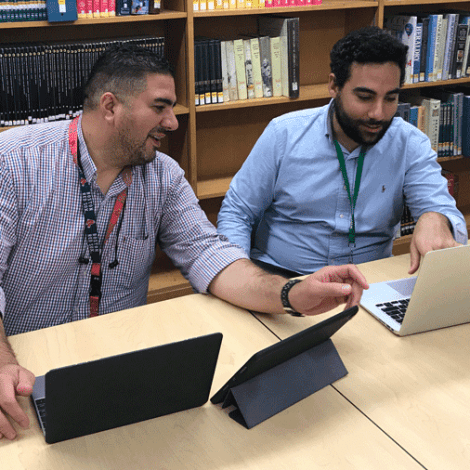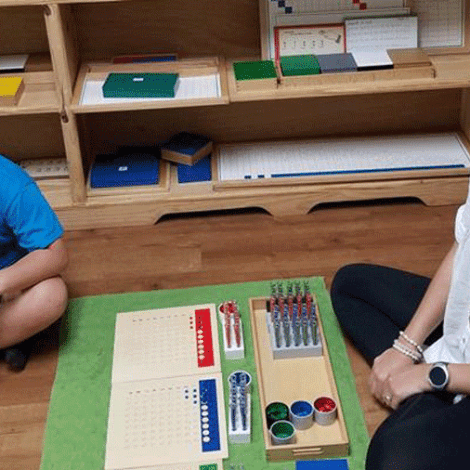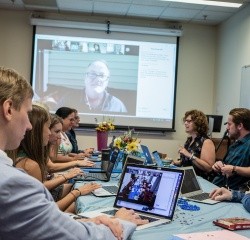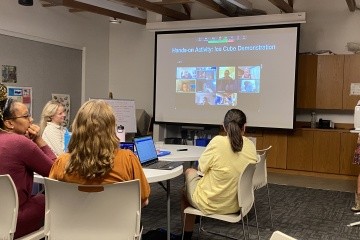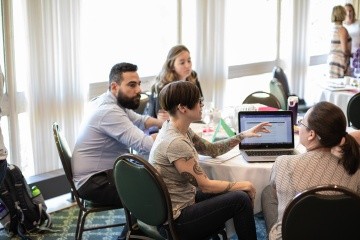This course listing contains all graduate courses with subjects X.EDUC, X.ELL, and X.SPED including those intended for other graduate programs. Courses from other subjects, such as X.MATH, may also apply to your program. Please contact your advisor if you are unsure of courses that are appropriate for your program.
X.EDUC-409 Schools, Schooling, and Society: An Introduction to Education and Social Policy
The course familiarizes students with the historical foundations of public education, current movements in education reforms such as Race to the Top, Common Core Standards, Every Student Succeeds Act, and theories of change. The course examines the social policies and catalysts that have caused transformation in society and public education and includes contemporary events. In keeping with Massachusetts Department of Education mandates for approved licensure programs, the course provides the foundational readings to prepare teachers for work in a diverse society. Topics include knowledge of curriculum; knowledge of learners; knowledge of educational goals, knowledge of social/cultural contexts; and pedagogical content knowledge.
X.EDUC-411 Policy Fluency: Current Issues in Education
In this learning experience, teacher leaders will deepen their understanding of how to share, spread, and scale their practices and convictions to impact the teaching profession beyond their classroom walls. Participants will engage in simulated project pitches, reflective writing, drafting and revising a blog post, and conversations with guest speakers working to shape policy and practice across the country. This course is intended for teacher leaders in both public and independent school contexts.
X.EDUC-413 Leading Colleagues Using Research: Bridging the Gap Between Research and Practice
Based on Domain 2 of the Teacher Leader Model Standards, this class helps build the skills, knowledge, and dispositions teacher leaders need to support colleagues in using the latest research and data to improve practice and student learning. Topics we will explore include types of research, examining the research process, the skills teacher leaders need to lead colleagues in using research to improve practice, research competencies, action research, data collection and analysis, how research makes instruction intentional and systematic, and how it allows us to make meaning out of numbers.
X.EDUC-419 Independent Schools: New Teachers Seminar
This course helps new independent school teachers answer questions that all teachers ask themselves on a daily basis: How do we best serve our students and their learning needs, across the multiple dimensions of learning styles, ethnicity, race, gender and class? As we design an experience to welcome and engage all of our students, how do we also nourish and sustain ourselves in this important work? The course includes cohort meetings as well as time for reflection, designing lesson plans, exploring how we organize our classrooms, and discussing how we support ourselves and each other.
X.EDUC-420 Human Development: 'Child and Adolescent Development'
In this course students will develop a foundational framework of knowledge about physical, cognitive and social/emotional development that can inform their teaching practice in the classroom. Through individualized exploration, students will have opportunities to delve into the study of the age group that they intend to teach, and the class will discuss specific topics particularly relevant to education, such as language development, gender, moral development, the nature of intelligence, and motivation. By the end of this course, students should be conversant in developmental theory and able to use it to support the pedagogical choices they will make as educators.
X.EDUC-422 Practicum Seminar on Teaching and Learning: Early Childhood and Elementary Education
The Integrated Methods Seminar focuses on supporting and building on key aspects of the intensive full-time supervised student teaching experience. Teacher candidates learn how to develop integrated curriculum units, address complex behavioral and management issues with increasing sophistication, delve more deeply into theory and practice, develop peer coaching and mentoring skills, develop habits of reflection, and prepare for job interviews. Additionally, there is an emphasis on social studies content and pedagogy. Specifically, students will be studying content of a meaningful elementary and early childhood social studies curriculum and devising lessons and units that address multiple learning needs, planning effective and aligned assessments, infusing best practices, and exploring integration opportunities. Linking critical learning from their work in social justice to issues of instructional equity and practice in the classroom is also part of the Seminar this semester.
X.EDUC-423 Student Teaching in Early Childhood and Elementary Schools
Students participate in full-time student teaching in early childhood and elementary classrooms for 15 weeks. During this semester-long field-based placement, students hone classroom management skills, implement an extended integrated curriculum unit, deliver lessons in all content areas, and develop a wide range of assessment skills. The practicum culminates in two weeks of Lead Teaching, during which the student is responsible for managing all aspects of the classroom program. Students work with classroom teachers and program supervisors to address Professional Teaching Standards as required by the Commonwealth of Massachusetts.
X.EDUC-424 Internship in Educational Settings
Graduate students undertake a supervised internship from January through June in an educational setting comprised of up to 600 hours. This would be a supervised, mentored experience, and tailored to the hours of the student, approved by a faculty member within the Professional and Graduate Education department. Evaluation of performance is determined by on-site visits, written assignments, as well as supervisor and mentor evaluations. Successful completion of the course is verified based on satisfactory submission of a final product/portfolio and presentation that demonstrates an integration of knowledge and skills gained through their program of study and internship experience.
X.EDUC-427 Practicum 1: Professional Development and Mentoring
Participants survey best practices in instructional coaching and professional development and implement these practices in their educational contexts. Topics include: cultivating positive mentoring/coaching relationships, observation protocols, developing and facilitating andragogically-sound professional learning, coaching for emotional resilience, and assessing professional learning. Participants actively apply skills in their own settings with specialized coaching from the course instructor and create a professional learning experience and/or approach to instructional coaching that is designed to meet the needs of students and teachers in their unique learning community.
X.EDUC-428 Critical Literacy Through Multicultural Children's Literature: Becoming Critically Literate
In this course, we will discuss sociopolitical issues reflected in children's literature (i.e., gender, race, class, sexuality, ability, etc.) and read across genres, themes, and perspectives. Teacher candidates will develop analytical practices to examine books' words and images, ask complex questions about power and language, and consider counternarratives through critical multicultural analytical practices. Teacher candidates will write text reflections, reader responses, and create a text set centered on a social issue of choice. In addition, teacher candidates will reflect on becoming critically literate educators and how a critical orientation to reading and teaching impacts their beliefs and practices.
X.EDUC-429 Using Art for Educational Advancement
This course focuses on using arts as a catalyst for change inside and outside of the classroom. It supports educators in deepening their pedagogical techniques using arts, and it supports leaders outside the classroom in exploring how to use art beyond the classroom to influence system change. Participants will engage in discussion around critical issues in education and problem solve for such issues using various forms of art. Techniques to be explored may include, but are not limited to: literature, visual arts, the graphic arts, the decorative arts, and performing arts. By the end of this course, participants will have a portfolio of resources that can be used in their areas of practice.
X.EDUC-430 The Process of Teaching and Learning in Secondary and Middle Schools
This course is intended to help prepare prospective secondary and middle school teachers for effective classroom instruction. The focus of this course is to explore a range of philosophies of education and existing classroom practices. The course uses the current educational landscape in order for teacher candidates to examine culturally relevant teaching and learning practices, teaching in multicultural settings, establishing the classroom climate, choosing instructional approaches, and attending to the needs of a range of learners.
X.EDUC-431 Student Teaching in Secondary and Middle Schools
Students participate in full-time student teaching in middle or secondary classrooms for 15 weeks. During this semester-long field-based placement, students hone classroom management skills, design and implement curriculum, and develop a wide range of assessment skills. Students work with classroom teachers and college supervisors to address Professional Teaching Standards as required by the Commonwealth of Massachusetts.
X.EDUC-433 Practicum Seminar on Teaching and Learning: Middle and Secondary Education
This weekly seminar provides students with opportunities to design and discuss case studies involving adolescents in middle and secondary school settings, review researched-based models of instruction, and classroom management, and engage in dialogue with professionals regarding numerous aspects of teaching and student learning. Additional topics covered include reviewing the legal obligations of teachers, addressing the needs of students with disabilities, English language learners, and developing effective communication between home and school.
X.EDUC-436 Exceptional Learners Internship I
Students pursuing an additional license are expected to complete a supervised field experience of at least 150 hours in an approved public school classroom within the licensure area pursued. Placements may be located within or outside of western Massachusetts. In addition to the field experience component, students attend regular course meetings. Reading and writing assignments are an opportunity to learn more about tracking student development, advocacy, utilizing action research as a tool for professional development and collaboration, and leveraging an additional license on the job market.
X.EDUC-437 Advanced Practicum: Professional Development and Mentoring
This course is the culmination of The Institute for Instructional Coaching. Participants reflect, refine, and expand upon the professional learning sessions they have developed, as well as their instructional coaching practice, while expanding their learning experience to enhance the impact in their context. Topics in this course include: developing systematic professional learning opportunities for new and experienced educators in a given setting, professional collaboration and co-facilitation, enhancing professional leadership through system-wide programming. Participants complete the institute as experts in ongoing, embedded, and personalized professional learning.
X.EDUC-441 Fostering a Collaborative Culture for Learning
This course is centered around Domain One of the Teacher Leader Model Standards, with an emphasis on creating cultures in our schools that support educator development and student learning. Modules include defining teacher leadership, exploring formal and informal teacher leadership roles, adult learning theory, facilitation of group learning and discussion, mitigating difficult discussions and building consensus, organizational change and the change process, building trust, and other skills to create inclusive cultures for professional growth (and student learning!).
X.EDUC-449 Equity and Social Justice: A Teacher's Role
In this course, participants will learn to address issues of social justice seamlessly and incorporate social justice into the design of their learning environments. This will be accomplished in three steps: First, participants will be assigned a self-awareness partner to process socialization around social issues. Second, participants will produce narratives about their social justice development. Finally, participants will create action plans that will create learning environments that don't shut down dialogues about difference, but open them up. Participants will then take this new learning and self-awareness and apply it to education systems outside of their classroom.
X.EDUC-450 Social-Emotional Learning and Development: Foundations of Social, Emotional, and Academic Development
In the course, educators will learn the foundational principles of social and emotional learning through an accelerated survey of foundations of SEL strategies in pedagogy, practice, and instructional leadership. They will explore how SEL advances educational equity and personal student growth by establishing affirming learning environments that feature trusting and collaborative relationships, rigorous and meaningful curriculum and instruction, and ongoing evaluation. Educators will examine the clear connection and the roles of the school in students' emotional and academic success. Educators will build a strong foundation in social emotional learning that includes equity-based, culturally responsive, and trauma sensitive practices through the use of case studies examples, personal reflection, and the building of resources for community use.
X.EDUC-451 Social-Emotional Learning and Development: Pedagogy and Practice
In this course, educators will explore ways to put the foundations of social and emotional learning (SEL) into practice. This exploration includes the examination of available resources, evaluation of ways in which SEL may be built into their current curriculum and instruction, and strategic development of collaboration and connections with educators, families, and other stakeholders on issues related to social and emotional learning. Educators will identify areas of strength and opportunity of the social and emotional well-being of students, reflect on their own social and emotional well-being, and create a plan of action for their own growth and the growth and empowerment of students.
X.EDUC-452 Topics in Social-Emotional Learning and Development
X.EDUC-452AC Topics in Social-Emotional Learning and Development: 'Advising and Counseling Students Beyond the Classroom'
Educators serve in multiple roles to support students in their academic, extracurricular, and, in some cases, dorm lives. This course will provide an overview of the following: school counseling principles, widely adopted models of comprehensive developmental counseling curricula, social-emotional learning, approaches in multicultural counseling, and mentoring students on academic and professional issues. We will also address identification, prevention, intervention, and crisis management strategies for topics including: relationships, mental health, trauma, and substance use/abuse. Students will explore how to analyze various types of student performance data to inform academic and non-academic programming.
X.EDUC-452AT Topics in Social-Emotional Learning and Development: 'Coaching and Athletics'
Educators in public and independent schools often serve in multiple roles, including as coaches for competitive and intramural sports. This class will provide an overview of issues related to supporting the student athlete, including the following: administering sport programs, principles of effective coaching, promoting and coaching the college-bound student athlete, compliance with governing bodies in sport, equity in athletics, team-building, event management, and sport safety.
X.EDUC-452NT Topics in Social-Emotional Learning and Development: 'Introduction to Social and Emotional Learning'
In this course, educators will engage with the principles of social and emotional learning (SEL) with a lens on how they can integrate these concepts into their work as teachers: building classroom community, teaching students to resolve their own conflicts, and helping their students develop compassion for others including those of different identities and backgrounds than their own. In relation to advocacy and teacher leadership, they will also explore some of the opposition and barriers to SEL, as well as effective arguments in support of SEL at a policy and "systems" level. Educators will strengthen their instruction and advocacy in equity-based, culturally responsive, and trauma-sensitive practices explored through case studies, instructional strategies, reflection, and development of a portfolio that applies their new knowledge to their specific teaching context.
X.EDUC-455 Outreach and Advocacy for Educational Change
This course integrates Teacher Leader Model Standards for Domains VI and VII: assessing community needs and values, engaging families and colleagues in partnerships, and advocating for students and for the teaching profession. Participants will explore culturally responsive teaching approaches and strategies for collaborating with families to support meaningful and relevant student learning and development. Participants will also learn how to use research, policies, and persuasive communications to help build appropriate programs, interventions, and advocacy efforts that promote positive outcomes for both students and teachers.
X.EDUC-457 Personal and Professional Leadership in Education
This course is designed to help educators cultivate their skills as reflective practitioners as a means of enhancing personal leadership development. Students will examine personal leadership qualities and the role of storytelling as leadership. Course participants will create individualized learning plans that allow for deeper exploration of personal and professional leadership interests. The menu of options for personalized learning will include further reading in the domains of adult development, professional learning, motivation, leadership and related topics.
X.EDUC-458 Owning Assessments and Data for Student Learning
Built around Domain 5 of the Teacher Leader Model Standards, this course helps teachers build the skills to do just that, as we explore organizational improvement through assessment design. Learn to facilitate and support colleagues in using assessment tools to inform decisions to improve practice and student learning. One module of this class includes an exploration of Improvement Science, a new methodology brought to education from the health field, where teachers will learn how small ideas can be tested and taken to scale, potentially impacted organizational change. Embedded in practice, focused on your personal and professional growth.
X.EDUC-459 Independent Schools: Experienced Teachers Seminar Practice
This course is designed for teachers with 2-5 years of classroom experience at independent schools. Building from participants' experience, the course focuses on improving teachers' use of evidence-based practices to support children's progress. Topics include: focused observation, instructional support, emotional support, classroom organization, giving and receiving feedback and designing your ideal classroom. Participants will reflect on and share feedback about their teaching practices, and continue to develop their practice in this engaging learning community.
X.EDUC-460 Subject-Specific Methods 1 for Middle and Secondary Teachers
This course is the first of two methods courses. Firmly embedded within the EL Education Model, it will provide opportunities for participants to explore the links among the theoretical underpinnings of expeditionary learning, experiential learning, and project-based learning through an interdisciplinary approach, with a focus on arts integration. Students will engage with the Understanding by Design (UBD) model of curriculum development, focusing on universal access to content for a full range of learners. Students will connect theory with practice and reflect on their practice.
X.EDUC-461 The Process of Teaching and Learning: Developing Literacy in Our Schools
Through a balanced and integrated approach, students will learn to develop literacy in our schools. Class members will learn about emergent literacy, diagnosing language needs, integrating phonics skills in a literature-based program, the teaching of process writing, children's fiction and nonfiction literature, and a variety of formative and summative ways to assess learning.
X.EDUC-462 Subject-Specific Methods 2
This advanced course builds on the design Subject-Specific Methods 1, and focuses on the development of subject specific curriculum units. Firmly embedded within the EL Education Model, links will be made between the theoretical underpinnings of subject specific pedagogy, differentiated learning, sheltered immersion, assessment, and the community/school/classroom/students. Students will connect theory with practice through their work with subject-specific experts from the field and through reflecting on their practice.
X.EDUC-462AR Subject-Specific Methods 2: 'The Arts'
This advanced course builds on the design principles and interdisciplinary approach of Subject-Specific Methods 1, and focuses on the development of subject specific curriculum units. Firmly embedded within the EL Education Model, links will be made between the theoretical underpinnings of subject specific pedagogy, differentiated learning, sheltered immersion, assessment, and the community/school/classroom/students. Students will connect theory with practice through their work with subject-specific experts from the field and through reflecting on their practice.
X.EDUC-462EN Subject-Specific Methods 2: 'English'
This advanced course builds on the design principles and interdisciplinary approach of Subject-Specific Methods 1, and focuses on the development of subject specific curriculum units. Firmly embedded within the EL Education Model, links will be made between the theoretical underpinnings of subject specific pedagogy, differentiated learning, sheltered immersion, assessment, and the community/school/classroom/students. Students will connect theory with practice through their work with subject-specific experts from the field and through reflecting on their practice.
X.EDUC-462FR Subject-Specific Methods 2: 'Foreign Languages'
This advanced course builds on the design principles and interdisciplinary approach of Subject-Specific Methods 1, and focuses on the development of subject specific curriculum units. Firmly embedded within the EL Education Model, links will be made between the theoretical underpinnings of subject specific pedagogy, differentiated learning, sheltered immersion, assessment, and the community/school/classroom/students. Students will connect theory with practice through their work with subject-specific experts from the field and through reflecting on their practice.
X.EDUC-462HS Subject-Specific Methods 2: 'History/Social Sciences'
This advanced course builds on the design principles and interdisciplinary approach of Subject-Specific Methods 1, and focuses on the development of subject specific curriculum units. Firmly embedded within the EL Education Model, links will be made between the theoretical underpinnings of subject specific pedagogy, differentiated learning, sheltered immersion, assessment, and the community/school/classroom/students. Students will connect theory with practice through their work with subject-specific experts from the field and through reflecting on their practice.
X.EDUC-462MA Subject-Specific Methods 2: 'Mathematics'
This advanced course builds on the design principles and interdisciplinary approach of Subject-Specific Methods 1, and focuses on the development of subject specific curriculum units. Firmly embedded within the EL Education Model, links will be made between the theoretical underpinnings of subject specific pedagogy, differentiated learning, sheltered immersion, assessment, and the community/school/classroom/students. Students will connect theory with practice through their work with subject-specific experts from the field and through reflecting on their practice.
X.EDUC-462SC Subject-Specific Methods 2: 'The Sciences'
This advanced course builds on the design principles and interdisciplinary approach of Subject-Specific Methods 1, and focuses on the development of subject specific curriculum units. Firmly embedded within the EL Education Model, links will be made between the theoretical underpinnings of subject specific pedagogy, differentiated learning, sheltered immersion, assessment, and the community/school/classroom/students. Students will connect theory with practice through their work with subject-specific experts from the field and through reflecting on their practice.
X.EDUC-466 Social-Emotional Learning and Development: Instructional Coaching And Mentoring
Having already studied the foundational principles of and pedagogical strategies for implementing social and emotional learning, educators in this course will learn best practices in the coaching and mentoring of other educators toward resource utilization, implementation of practices, and the identification and embodiment of dispositions that promote social and emotional learning. Educators in this course will begin to train other educators to be culturally responsive, trauma-informed, reflective practitioners who attend to the social and emotional well-being of themselves, their students, and the communities they serve. Educators will engage in practical application and evaluation of their budding skills.
X.EDUC-467 Coaching, Mentoring, and Facilitating Instructional Improvements
This course provides opportunities for teachers to design, develop, critique, implement, give, and receive feedback on professional development experiences that align with the Common Core standards and the particular needs of the school/district's participating staff. Modules include staying focused on content while developing collaborative relationships, engaging in reflective dialogue with teachers and administrators, developing leadership skills, professional growth, and technology for collaborative learning. Participants will be able to individualize their learning experience based on an area of choice for personal and professional growth: instructional coaching, mentoring, or peer coaching.
X.EDUC-468 Leadership in Practice for Educators
In this course students will develop their goals as teacher leaders and will engage in discussions, readings, modules, and activities that support professional growth. Critical course concepts will be introduced in a whole group book study format. Additionally, students will explore opportunities for leadership in education through conversations with guest experts in the field. At the culmination of the course students will complete an articulation of practice and professional development plan.
X.EDUC-471 Communications and Networking for Teachers
In this course, students will develop their skills of networking, communication, and leadership by organizing special events such as panel discussions, webinars, public forums, and speaker series' on current topics and pressing issues in the field of education. Students will collaborate to identify areas of focus for these events and will then work with the course instructor to recruit speakers, develop promotional campaigns and communications, facilitate sessions, create resource materials, and engage constituents.
X.EDUC-476 Independent School: Beyond the Classroom
The independent school faculty member wears many "hats" in addition to that of the teacher. Students in this course study the non-teaching aspects of independent school work, improving their ability to serve as stewards of their schools' missions. Guest speakers from independent schools will address these roles and facilitate students' investigation of other topics including school governance and administration, admissions, advancement, athletics, counseling, student and residential life, and more. Coursework will include analyzing case studies, budgets, interviewing various departments and jobs within an independent school, and an in-depth case study of the student's context based on current independent school standards and best practices. Student work will culminate in the creation of a personal inventory and growth plan for successful career development in independent schools.
X.EDUC-477 Seminar on Effective Teaching and Learning Strategies for Practitioners
In this hands-on course, participants working in classrooms explore issues and challenges of their professional and classroom practice, including: workshopping new curricular ideas, integrating evidence-based practices for effective classroom management and teaching, and ways to support other areas of the participants' administrative or co-curricular responsibilities. Participants attend group seminars and individual conferences intended to strengthen their confidence in the classroom and capacity to successfully engage diverse learners. Evaluation of performance is determined through course observations and by written assignments.
X.EDUC-481 Internship in Education Administration
Graduate students undertake an internship of up to 500 hours in an educational setting under the supervision of an PreK-12 school administrator from January through June. This would be a supervised, mentored experience, that is tailored to the student's needs and interests, and approved by a faculty member within the Professional and Graduate Education department. Evaluation of performance is determined by on-site visits, written assignments, as well as supervisor and mentor evaluations. Successful completion of the course is verified based on satisfactory submission of a final product/portfolio and presentation that demonstrates an integration of knowledge and skills gained through their program of study and internship experience.
X.EDUC-489 Catapult! Capstone Course
This course is designed to catapult students' professional and personal leadership journey to the next level. It serves as an idea incubator, helping give teacher leaders the support and direction they need to propel themselves forward in their work and launch teacher-created ideas to improve education for all students. In this class, graduate students will demonstrate and document the impact of their knowledge gained throughout their journey at Mount Holyoke College. Students will choose a domain of the Teacher Leader Model Standards to focus their capstone work, then they will choose one of four pathways for the semester: a research study, a teacher-created project, a teacher leader internship, or National Board candidacy. They will apply their skill and knowledge under a teacher leader coach, who will support them and engage in weekly reflective practice of their teacher leadership work. At the end of the semester, teachers will complete and share a portfolio that demonstrates how their experiential learning experience has enhanced their practice as a leader and a teacher leader.
X.EDUC-495 Independent Study
X.ELL-403 Research in Teaching English Language Learners
This course introduces teacher candidates to the sociocultural context of schooling and examines current research in the field of ELL teaching and learning. The course will support teacher candidates in developing an orientation toward teaching as inquiry, as well as the ability to read and conduct classroom research. Critical qualitative methods (e.g., ethnography, case study, action research) will be considered and teacher research in the ELL classroom will be emphasized. Teacher candidates will develop and complete a qualitative inquiry project that investigates an aspect of language teaching or learning of interest to them.
X.ELL-406 Introduction to Teaching English Language Learners
This introductory course examines theories and issues related to multilingual education and teaching English language learners in the United States today. Specifically, students will be introduced to approaches and pedagogies that support teaching linguistically and culturally diverse learners in the PK-12 setting and the places where second language acquisition theory and practice intersect. In addition, this course will prepare participants to sit for the Massachusetts ESL Test for Educator Licensure (MTEL).
X.ELL-416 Language Assessment and Classroom Practice
This course provides an introduction to theory and practice in assessing multilingual students' academic English proficiency and content knowledge. Students will learn about purposes of and types of language and content assessments for multilingual students (e.g., large-scale standardized tests like WIDA ACCESS, alternative assessments like portfolios, formative assessments) and practice designing assessment tasks and using rubrics to evaluate student writing. Students will learn to distinguish between assessing content knowledge and language proficiency and how to apply assessment findings to their teaching practice.
X.ELL-418 Second Language Acquisition and Classroom Practice
This course will a) introduce students to theories of second language acquisition (cognitive, social, and linguistic influences) and how these inform teaching practices, and b) introduce teaching methods and approaches to teaching ELLs so students can begin to make informed context-sensitive decisions about language teaching methods, techniques, lesson planning, materials, classroom management, etc.
X.ELL-421 Linguistics for Teachers
This course provides teacher candidates with an in-depth analysis of the structural and functional components of language: syntax, phonetics, phonology, morphology, semantics, register, and genre. Teacher candidates will apply concepts to language teaching and learning. The course will also include an in-depth look at functional linguistics and critical genre theory, focusing on how language functions in academic speech and writing.
X.ELL-422 Practicum Seminar in Teaching and Learning: Elementary ELL Education
This licensure-level weekly seminar provides teacher candidates with opportunities to examine curriculum development models, develop curricular units utilizing state and national content area standards, review research-based models of classroom management, and engage in dialogue with practicing teachers regarding various aspects of teaching and learning. Additional topics covered will include: implementing translanguaging pedagogy, developing productive partnerships between ELL and content area teachers, legal obligations of teachers, and home-school communication.
X.ELL-423 Student Teaching English Language Learners in Elementary Schools
Teacher candidates participate in full-time supervised student teaching of grades PK-6 ELLs from for 15 weeks. Teacher candidates will hone classroom management skills, implement extended curricular units designed to support students' development of disciplinary literacies, deliver lessons to support disciplinary English development in all content areas, and develop a wide range of assessment skills. Evaluation of performance is determined by on-site visits and written assignments. Successful completion of the course is premissed based on satisfactory submission of the CAP requirements for licensure preparation.
X.ELL-426 Methods in Teaching English Language Learners (ELL Methods)
This course focuses on applying theories, principles, and evidence-based methods of second language acquisition to the development of materials, lessons, and curricula for teaching disciplinary English to K-12 speakers of other languages. Teacher candidates will cultivate skills in the design and delivery of contextualized lesson plans, develop expertise in the selection and evaluation of materials such as textbooks, computer-assisted materials, and realia, and demonstrate their understanding of critical issues in teaching ELLs. Teacher candidates must simultaneously be participating in pre- practicum observations.
X.ELL-431 Student Teaching English Language Learners in Secondary Schools
Teacher candidates participate in full-time supervised student teaching of grades 5-12 ELLs for 15 weeks. Teacher candidates will hone classroom management skills, implement extended curricular units designed to support students' development of disciplinary literacies, deliver lessons to support disciplinary English development in all content areas, and develop a wide range of assessment skills. Evaluation of performance is determined by on-site visits and written assignments. Successful completion of the course is premissed based on satisfactory submission of the CAP requirements for licensure preparation.
X.ELL-433 Practicum Seminar in Teaching and Learning: Secondary ELL Education
This licensure-level weekly seminar provides teacher candidates with opportunities to examine curriculum development models, develop curricular units utilizing state and national content area standards, review research-based models of classroom management, and engage in dialogue with practicing teachers regarding various aspects of teaching and learning. Additional topics covered will include: implementing translanguaging pedagogy, developing productive partnerships between ELL and content area teachers, legal obligations of teachers, and home-school communication.
X.ELL-436 Exceptional Learners Internship I
Students pursuing an additional license are expected to complete a supervised field experience of at least 150 hours in an approved public school classroom within the licensure area pursued. Placements may be located within or outside of western Massachusetts. In addition to the field experience component, students attend regular course meetings. Reading and writing assignments are an opportunity to learn more about tracking student development, advocacy, utilizing action research as a tool for professional development and collaboration, and leveraging an additional license on the job market.
X.ELL-451 English Language Development Standards and Assessment Framework
This course introduces teacher candidates to the WIDA English language development standards and assessment framework, with a particular focus on understanding the large-scale standardized assessment of English language learners (e.g., WIDA ACCESS 2.0). This course will prepare teacher candidates to understand test design, prepare to participate in administrator training, and interpret score reports in ways that support their ability to use assessment to inform instruction and communicate with students and families about students' English language development needs and progress.
X.ELL-463 Teaching English Language Learners: Sheltered English Immersion Endorsement Standalone
This course is offered for teachers seeking SEI endorsement. It serves as the ReTELL course that provides an overview of pragmatic pedagogical strategies for including English Language Learners in content area classroom instruction. Readings in language acquisition theory, language learning and teaching, effective lesson design and assessment, Sheltered Instruction Observation Protocol and knowledge of intercultural learners are covered. Students will have experience developing and adapting lessons and curriculum to address the needs of students in their pre-practicum settings.
X.SPED-416 Interventions for Behavior and Classroom Management
In this course students will review research, theories, and practices for responding to challenging behavior. Topics will include establishing effective rules and procedures, classroom-and school-wide behavior management systems, and approaches for addressing individual student behavior and developing relationships with children and support professionals to improve behavior across settings.
X.SPED-421 Assistive Technology for Special Education
This course provides an introduction to teaching with technology and, more specifically, how assistive technologies can be used by individuals with disabilities, PreK-12, to enhance the teaching and learning experience. Students will have the opportunity to explore a range of devices, applications, software, etc. that enhance access to academic and non-academic learning in schools. Course assignments will help students develop an understanding of how to assess student assistive technology needs, employ and monitor interventions, and improve teaching through the use of technology.
X.SPED-422 Practicum Seminar: Teaching and Learning for Moderate Disabilities Licensure PreK-8
During seminar students will discuss the teaching of children PreK-8 with mild and moderate disabilities in school settings, review research-based models of instruction, and engage in dialogue with professionals regarding numerous aspects of teaching and student learning. Topics covered include: preparing and implementing IEPs, designing and modifying curriculum, use of assistive technology, developing a positive classroom climate and addressing challenging behavior, collaboration with other agencies, and the legal regulations governing special education. In addition, seminars will include discussion of best practices for educating English language learners and for developing effective communication between home and school.
X.SPED-423 Student Teaching in Inclusive and Substantially Separate Classrooms for Students PreK-8 with Moderate Disabilities
Teacher Candidates (TC) undertake full-time supervised student teaching for 15 weeks in PreK-8 classrooms for students with Mild/Moderate Disabilities. The student teaching comprises over 500 hours of a mentored experience, two-thirds of which will occur in inclusive settings and one-third in a substantially separate setting, to satisfy the state requirements for licensure. Evaluation of performance is determined by on-site visits, written assignments, and successful completion of the course is verified based on satisfactory submission of the CAP requirements for licensure preparation.
X.SPED-426 The Inclusive Classroom
This course surveys the etiology, diagnosis, and remediation of learning differences including dyslexia, attention deficit disorder, autism, as well as factors that influence a child's readiness to learn. Students present, discuss, question, and exchange ideas that contribute to an overall understanding of special education in the field. With an emphasis on inclusion in schools, students explore the impact of current policies, assessments, and practices. Students will have the opportunity to examine and practice applying interventions and approaches that support student engagement and prosocial behavior. The focus is on adapting the learning environment, classroom structures, and teaching approach so that all children, regardless of learning strengths and needs are supported to reach their potential and achieve meaningful goals.
X.SPED-431 Student Teaching in Inclusive and Substantially Separate Classrooms for Students Grades 5-12 with Moderate Disabilities
Teacher Candidates (TC) undertake full-time supervised student teaching for 15 weeks in Grades 5-12 classrooms for students with Mild/Moderate Disabilities. The student teaching comprises over 500 hours of mentored experience, two-thirds of which will occur in inclusive settings and one-third in a substantially separate setting, to satisfy the state requirements for licensure. Evaluation of performance is determined by on-site visits, written assignments, and successful completion of the course is verified based on satisfactory submission of the CAP requirements for licensure preparation.
X.SPED-433 Practicum Seminar: Teaching and Learning for Moderate Disabilities Licensure 5-12
During seminar students will discuss the teaching of children grades 5-12 with mild and moderate disabilities in school settings, review research-based models of instruction, and engage in dialogue with professionals regarding numerous aspects of teaching and student learning. Topics covered include: preparing and implementing IEPs, designing and modifying curriculum, use of assistive technology, developing a positive classroom climate and addressing challenging behavior, collaboration with other agencies, and the legal regulations governing special education. In addition, seminars will include discussion of best practices for educating English language learners and for developing effective communication between home and school.
X.SPED-436 Exceptional Learners Internship I
Students pursuing an additional license are expected to complete a supervised field experience of at least 150 hours in an approved public school classroom within the licensure area pursued. Placements may be located within or outside of western Massachusetts. In addition to the field experience component, students attend regular course meetings. Reading and writing assignments are an opportunity to learn more about tracking student development, advocacy, utilizing action research as a tool for professional development and collaboration, and leveraging an additional license on the job market.
X.SPED-441 Differentiated Instruction for Diverse Learners
This course will address the design and modification of curriculum, instructional materials, and general education classroom environments for students with moderate disabilities. Students will learn ways to prepare and maintain students with disabilities to succeed in general education classrooms, to monitor academic and behavioral progress, and to make instructional decisions accordingly. Students will experiment with a variety of technological tools for teaching PreK-12 such as applications and web-based tools for student engagement and progress monitoring. Coverage will include instruction on assistive technology, including AAC, to support students with disabilities to learn in the least restrictive environment.
X.SPED-447 Assessment and Instruction for Exceptional Learners
In this class, students will examine legal policies and ethical principles of measurement and assessment related to special education referral, eligibility, and placement for individuals with exceptionalities, including those from culturally and linguistically diverse backgrounds. Through course activities students learn to: administer psychoeducational and achievement tests; explore formal and informal assessments that minimize bias; interpret results and use data to guide educational decisions for individuals with exceptionalities; make collaborative, data-based decisions with and about learners; monitor the learning progress of individuals with exceptionalities.
X.SPED-481 Special Education Law: Transitions, Collaboration, and Applications
This online course will review the state and federal laws and regulations that govern special education and their implications, including preparation and evaluation of Individualized Education Programs (IEPs), transition services and services provided by other agencies, strategies for building and maintaining collaborative partnerships with team members, the role of families in advocacy and planning, and cultural variables that influence school culture and accessibility.
X.SPED-495 Independent Study
Students enrolled in this course collaborate with the instructor to further their learning in teacher leadership through advanced independent research or an academic project on a specific topic that is distinct from existing course offerings within the MATL program of study. Together they outline a series of academic activities and unique work products that the student generates throughout the semester to demonstrate learning. Some examples include: conducting in-depth research, developing programs or curriculum related to instructional leadership, mentoring, and coaching, writing comprehensive papers for presentation and/or publication in education journals.



